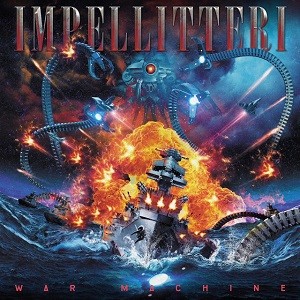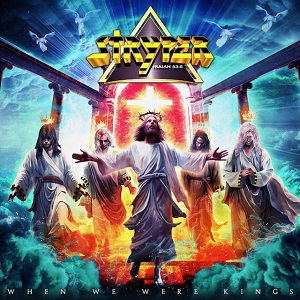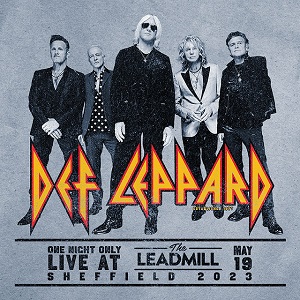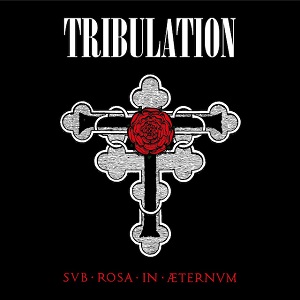THEATRE OF TRAGEDY - 15 The Hard Way
November 24, 2008, 15 years ago
Drummer Hein Frode Hansen and his Theatre Of Tragedy bandmates recently celebrated a 15 year career of highs and lows, but they didn’t mark the occasion with a new album, an anniversary tour, or even a one-off show. Instead, they kept it all in the family, reflecting on the past over a few drinks as they look to the future. A new album is indeed in the works, but Hansen will be the first to tell you that the Theatre’s members know they’ve had their heyday. Anything they do now will be on a much smaller scale compared to the early years. This by choice rather than due to lack of label support or current industry woes, however, and Theatre Of Tragedy are quite happy with the relaxed pace of life. Probably not something the diehard fans that are still hanging around want to hear, but times change. In this case for the better, according to Hansen.
“Everyone in the band has gone through a lot of phases since we’ve been in the band. We’ve come to terms with having had our busy years of touring and our big budget, best selling albums already under our belts. We’re basically taking the next step in a comfortable fashion, sort of like using whatever left over energy we have for it. We do Theatre Of Tragedy for fun now. We don’t do it five times a week every week anymore. We have fun getting together to play and write songs, but there might be a one or two month gap in between. The band isn’t our top priority anymore because most of us have kids and families. Work and studies are our top priority.”“Someone like Lorentz (Aspen/keyboards), he turned 30 this year, so he’s spent half his life in Theatre. He’s made a lot of sacrifices over the years for the band. He joined us when he was 15, we put out our first album when he was 16, so he put a lot of studies and things like that on hold over the years. And he’s always taken jobs that made it easy for him to combine with being in the band. Me personally, I’m going to be a father for the second time around in a few months, so things are pretty hectic. But, we manage to get together and we still have a really good relationship as friends, which is more than I can say about a lot of other bands I know.”
Theatre Of Tragedy’s last album, Storm (released in 2006), was fairly low key in light of the fact they were introducing a new female vocalist, Nell Sigland, and had returned to their goth metal roots. After two albums of industrial electronica – Musique and Assembly in 2000 and 2002 respectively – and the controversial firing of original singer Liv Kristine Espenaes Krull in 2003, the natural expectation was that all eyes would be watching to see if the band had matched their old glory or crashed and burned. Perhaps it was due to the popularity of Liv Kristine’s new band Leaves’ Eyes – attention due in large part to Theatre’s success – but Storm simply ran its course without any real fanfare or cock-ups. Still, Hansen is very proud of the record.
“I think with Storm we had a lot of things to prove,” he says. “That wasn’t necessarily in the back of our minds, but we wanted to make a record that somehow combined a bunch of things we’ve done in the past. We wanted to make a record without any pressure from record companies, just take it back to our own level and do everything ourselves. We were complete Nazis about everything on Storm (laughs); where we recorded, what we recorded, everything. We were fed up with all the Nuclear Blast / EastWest / Massacre people telling us how to do everything right up to how to write the songs. We’ve been together so long now and we’ve had so many weird experiences in our career with record companies, it’s hilarious.”“I’m quite proud of Storm because it was something we made against the storm,” laughs Hansen. “Everybody wrote us off as dead. We could have made an album long before we actually did because we already had Nell in the band working with us in the second half of 2003, but we couldn’t announce her as an official member because there were some contract issues that had to be taken care of first. Storm was completely written by that time, but we never felt that we had to hurry because we wanted to make a really good record. We didn’t want to rush anything out and make it look like we were trying to compete with Leaves’ Eyes. We didn’t want to sacrifice as much as Liv did. We’ve never been that kind of a band. We’ve always treasured everybody’s opinion, so it was never a consideration to throw together a record to compete with any other acts.”
With the band’s return to more familiar musical territory on Storm, questions were raised as to whether Theatre Of Tragedy had in fact been pushed in an industrial direction on the previous two albums by their former label.
“A lot of people think that, but I have to say that the only people we can blame for the change in the music at the time is ourselves,” Hansen admits. “We were just being experimental. The first time our manager heard the Musique album, he totally freaked. He was like, ‘Oh my God, what have you done? This isn’t what we talked about….’ (laughs). In retrospect, maybe the changes were a bit drastic, but we were living in our own musical universe and we had this vision that people were evolving musically together with us into this style. Apparently we were a bit wrong there (laughs).”“We were into that stuff way earlier, as far back as 1995 before we did Velvet Darkness They Fear,” Hansen says of the band’s musical (de)evolution at the time. “It wasn’t a big step for us, but we didn’t have the knowledge or the resources to pull that kind of music off until much later. I think maybe we overdid it a bit. We got some really funny mails and guestbook entries when the Musique record came out. We’ve had our laughs with that since then.”
The vast majority of early Theatre Of Tragedy fans consider Velvet Darkness They Fear to be the pinnacle of the band’s career. Released in 1996, it had a huge impact on the metal scene and effectively demolished pre-conceived notions of how female vocals and classical elements could be used. It’s safe to say that many present day metal bands owe their existence in large part to the Theatre.
“I know for a fact that lot of the newer bands out there have cited us as a major influence, like Tuomas Holopainen of Nightwish,” says Hansen. “He’s said that one of his main influences when he started his band was Theatre Of Tragedy, and for us that’s a compliment. We never had an elaborate plan, we never made a long term scheme. We’ve always just gone from one album to the next. We’re proud of what we’ve done so far, and obviously looking back now there are things we would have done differently, but all we can do is stand for what we’ve accomplished and be proud. I can honestly say that at each step of the way we’ve done the best we could at the time. When I listen to our stuff, it’s very diverse, but I think you can still hear it’s the same band. We still play some of the old songs live and I still like to play stuff from Velvet Darkness. But obviously, with any long term band it’s always more fun to play the newer songs.”Velvet Darkness also gave the black and blue gothic metal scene a fresh new face and approach, opening things up to a wider audience.
“I think the whole thing with Velvet Darkness being labelled as gothic had to do with the whole atmosphere, especially ‘Der Tanz der Schatten’. That’s the song that has the most goth-like feel out of any of them. The other stuff is quite diverse; a song like ‘Bring Forth Ye Shadow’ was more like black metal than anything. There were even black metal vocals on that song at one point, actually.”Theatre Of Tragedy’s fanbase is sharply divided with regards to the band’s current sound even though they’ve returned to familiar territory. While some followers have made peace with Nell singing in Liv Kristine’s place and male vocalist Raymond Rohonyi having traded in his growls for clean vocals and spoken word, others most certainly have not. Hansen isn’t surprised.
“It’s one way or the other, and I don’t think we’ll ever be able to gather all the old Theatre fans again. You have to keep in mind that some of those old fan are even older than us now (laughs). Our major audience back in the mid-90s, who were between 20 and 30, some of those people are coming in on 45 now, and those were the people that bought records back then. The thing with metal is that as the fans get older, the bands probably lose about 30% of them because their priorities change, and when they get to a certain age they don’t really listen to the music as much anymore or they deny that they ever liked it. That’s crap, and I find it very self-contradictory. I mean, I’ve grown up with this stuff, I’ve been listening to this music since I was kid, so I don’t believe it’s something you can shake off. But, oh well…”In any case, a new Theatre Of Tragedy album is in the works and due to be released in early 2009 through AFM Records. Hansen offers a look inside…
“There are some tracks that are left over from Storm, stuff that we couldn’t finish up in time for that album. So, there will be some of that stuff on the new album, but having said that, it’s not really in the Storm style. All in all I’d say it sounds a lot more diverse. It’s also slower and a more atmospheric in a way. There’s more piano, which is soft and fragile, but there’s some pretty heavy stuff as well, at least as far as Theatre Of Tragedy goes (laughs). There’s not going to be any growling vocals, though; I’m pretty sure about that. I don’t think anybody could drag Raymond into the studio to do growling vocals anymore. It would have to be a million euro contract for him to do that (laughs).”And yes, there are changes afoot yet again.
“We’ve actually gone back to the way we used to write music which we haven’t done since Velvet Darkness,” Hansen reveals. “We’ve always experimented with ways of writing songs. We’ve been through the whole mp3 thing sending files to each other and piecing songs together on the computer, and that’s always ended with a lot of frustration. So we decided that if we’re going to do a new record, screw it, we get together four or five times over the next year and jam out the songs, sit down and explore the ideas as a unit. That’s what we did this time, writing and arranging in the rehearsal room for the most part. It’s more of a back to basics kind of thing.”










